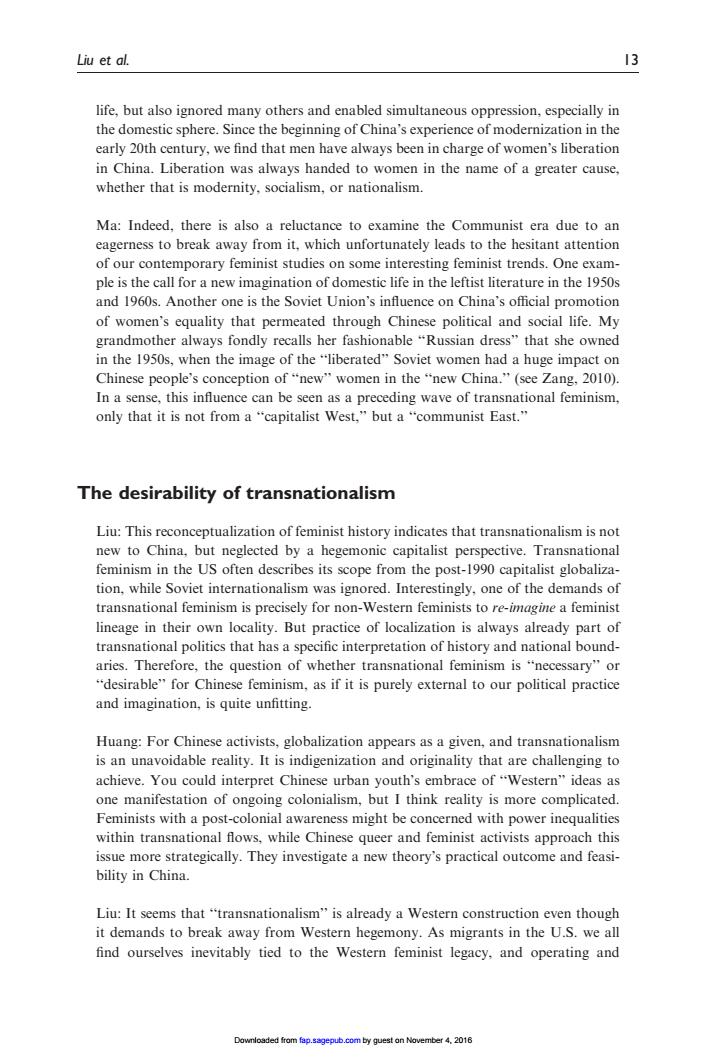正在加载图片...

Liu et al. 13 life,but also ignored many others and enabled simultaneous oppression,especially in the domestic sphere.Since the beginning of China's experience of modernization in the early 20th century,we find that men have always been in charge of women's liberation in China.Liberation was always handed to women in the name of a greater cause, whether that is modernity,socialism,or nationalism. Ma:Indeed,there is also a reluctance to examine the Communist era due to an eagerness to break away from it,which unfortunately leads to the hesitant attention of our contemporary feminist studies on some interesting feminist trends.One exam- ple is the call for a new imagination of domestic life in the leftist literature in the 1950s and 1960s.Another one is the Soviet Union's influence on China's official promotion of women's equality that permeated through Chinese political and social life.My grandmother always fondly recalls her fashionable "Russian dress"that she owned in the 1950s,when the image of the"liberated"Soviet women had a huge impact on Chinese people's conception of "new"women in the "new China."(see Zang,2010). In a sense,this influence can be seen as a preceding wave of transnational feminism, only that it is not from a“capitalist West,.”but a "communist East.” The desirability of transnationalism Liu:This reconceptualization of feminist history indicates that transnationalism is not new to China,but neglected by a hegemonic capitalist perspective.Transnational feminism in the US often describes its scope from the post-1990 capitalist globaliza- tion,while Soviet internationalism was ignored.Interestingly,one of the demands of transnational feminism is precisely for non-Western feminists to re-imagine a feminist lineage in their own locality.But practice of localization is always already part of transnational politics that has a specific interpretation of history and national bound- aries.Therefore,the question of whether transnational feminism is "necessary"or "desirable"for Chinese feminism,as if it is purely external to our political practice and imagination,is quite unfitting. Huang:For Chinese activists,globalization appears as a given,and transnationalism is an unavoidable reality.It is indigenization and originality that are challenging to achieve.You could interpret Chinese urban youth's embrace of"Western"ideas as one manifestation of ongoing colonialism,but I think reality is more complicated. Feminists with a post-colonial awareness might be concerned with power inequalities within transnational flows,while Chinese queer and feminist activists approach this issue more strategically.They investigate a new theory's practical outcome and feasi- bility in China. Liu:It seems that "transnationalism"is already a Western construction even though it demands to break away from Western hegemony.As migrants in the U.S.we all find ourselves inevitably tied to the Western feminist legacy,and operating and Downloaded from fap.sagepub.com by guest on November 4.2016life, but also ignored many others and enabled simultaneous oppression, especially in the domestic sphere. Since the beginning of China’s experience of modernization in the early 20th century, we find that men have always been in charge of women’s liberation in China. Liberation was always handed to women in the name of a greater cause, whether that is modernity, socialism, or nationalism. Ma: Indeed, there is also a reluctance to examine the Communist era due to an eagerness to break away from it, which unfortunately leads to the hesitant attention of our contemporary feminist studies on some interesting feminist trends. One example is the call for a new imagination of domestic life in the leftist literature in the 1950s and 1960s. Another one is the Soviet Union’s influence on China’s official promotion of women’s equality that permeated through Chinese political and social life. My grandmother always fondly recalls her fashionable ‘‘Russian dress’’ that she owned in the 1950s, when the image of the ‘‘liberated’’ Soviet women had a huge impact on Chinese people’s conception of ‘‘new’’ women in the ‘‘new China.’’ (see Zang, 2010). In a sense, this influence can be seen as a preceding wave of transnational feminism, only that it is not from a ‘‘capitalist West,’’ but a ‘‘communist East.’’ The desirability of transnationalism Liu: This reconceptualization of feminist history indicates that transnationalism is not new to China, but neglected by a hegemonic capitalist perspective. Transnational feminism in the US often describes its scope from the post-1990 capitalist globalization, while Soviet internationalism was ignored. Interestingly, one of the demands of transnational feminism is precisely for non-Western feminists to re-imagine a feminist lineage in their own locality. But practice of localization is always already part of transnational politics that has a specific interpretation of history and national boundaries. Therefore, the question of whether transnational feminism is ‘‘necessary’’ or ‘‘desirable’’ for Chinese feminism, as if it is purely external to our political practice and imagination, is quite unfitting. Huang: For Chinese activists, globalization appears as a given, and transnationalism is an unavoidable reality. It is indigenization and originality that are challenging to achieve. You could interpret Chinese urban youth’s embrace of ‘‘Western’’ ideas as one manifestation of ongoing colonialism, but I think reality is more complicated. Feminists with a post-colonial awareness might be concerned with power inequalities within transnational flows, while Chinese queer and feminist activists approach this issue more strategically. They investigate a new theory’s practical outcome and feasibility in China. Liu: It seems that ‘‘transnationalism’’ is already a Western construction even though it demands to break away from Western hegemony. As migrants in the U.S. we all find ourselves inevitably tied to the Western feminist legacy, and operating and Liu et al. 13 Downloaded from fap.sagepub.com by guest on November 4, 2016